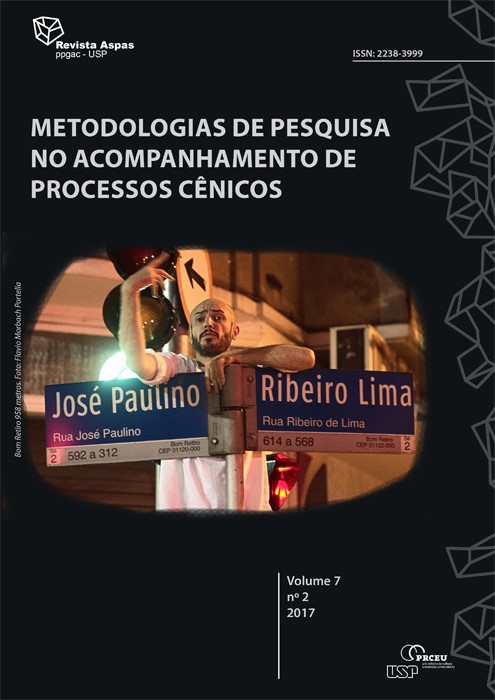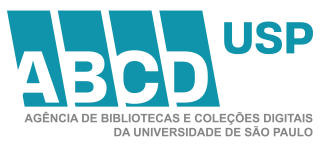Methodological bricolage in the understanding of interactive performances in the public space
DOI:
https://doi.org/10.11606/issn.2238-3999.v7i2p78-96Keywords:
Urban space, Performance, Methodology, Participation, Artistic practice.Abstract
This article discusses new perspectives in the conduction of academic studies that can generate a methodological pluralism through the approximation of theoretical reflection and practical elaboration. It presents a research project that included the design of the performance Chronica Mobilis to exemplify how the artistic creation process can serve as the main mechanism to the understanding of the experience of both, the researcher-artist and the people in relation to the work conceived. The methodological bricolage made by the aforementioned study, in a combination between artistic and traditional scientific methods, points to a knowledge that can also be acquired through the practical process. This article argues for the validity and legitimation of this method to the creation of knowledge in the experiential sense.
Downloads
References
ACETI, L. Meanderings and reflections on locative art. Leonardo Electronic Almanac, San Francisco, v. 21, n. 1, p. 10-13, 2016.
CANDY, L. Research and creative practice. In: CANDY, L; EDMONDS, E. A. (org.). Interacting: art, research and the creative practitioner. Faringdon: Libri Publishing Ltd, 2011. p. 33-59.
DEBORD, G. Theory of the Dérive. Internationale Situationniste, Paris, v. 2, p. 50-54, 1958.
EISNER, E. Does arts-based research have a future? Inaugural lecture for the first European conference on arts-based research Belfast, Northern Ireland, June 2005. Studies in Art Education, Abingdon, v. 48, n. 1, p. 9-18, 2006.
GALLOWAY, A. A brief history of the future of urban computing and locative media. 2008. 304 f. Tese (Doutorado em Filosofia) – Departmento de Sociologia e Antropologia, Carleton University, Ottawa, 2008.
GREENWOOD, J. The limits of language: a case study of an arts-based research exploration. New Zealand Journal of Research in Performing Arts and Education: Nga mahi a Rehia no Aotearoa, Christchurch, v. 6, p. 89-100, 2016.
KINCHELOE, J. L. On to the next level: continuing the conceptualization of the bricolage. Qualitative Inquiry, Thousand Oaks, v. 11, n. 3, p. 323-350, 2005.
LATHER, P. Fertile obsession: validity after poststructuralism. The Sociological Quarterly, Abingdon, v. 34, n. 4, p. 673-693, 1993.
LEMOS, A.; JOSGRILBERG, F. Comunicação e mobilidade: aspectos socioculturais das tecnologias móveis de comunicação no Brasil. Salvador: Edufba, 2009.
MCNIFF, S. Art-based research. In: KNOWLES, J. G.; COLE, A. L. (org.). Handbook of the arts in qualitative research: perspectives, methodologies, examples, and issues. Thousand Oaks: Sage Publications, 2008. p. 29-40.
ROLLING, J. H. Arts-based research primer. Nova Iorque: Peter Lang, 2013.
SHELLER, M; IVERSON, H. L.A. Re.Play: Mobile Network Culture in Placemaking, Leonardo Electronic Almanac, San Francisco, v. 21, n. 1, p. 14-25, 2016.
TUTERS, M.; VARNELIS, K. Beyond locative media: giving shape to the internet of things. Leonardo Electronic Almanac, San Francisco, v. 39, n. 4, p. 357-363, 2006.
ZIMMERMAN, E. Play as research: the iterative design process. In: LAUREL, B. Design research: methods and perspectives. Cambridge, MA: MIT Press, 2003. p. 176-184.
Downloads
Published
Issue
Section
License
Copyright (c) 2018 Revista Aspas

This work is licensed under a Creative Commons Attribution 4.0 International License.
Whenever publishing material referring to the article published in the aSPAs Journal, the authors commits to mentioning such publication as follows:
“This article was originally published by aSPAs Journal volume (insert the volume), number (insert the number) in the year (insert the year) and can be accessed in: http://revistas.usp.br/aspas"







